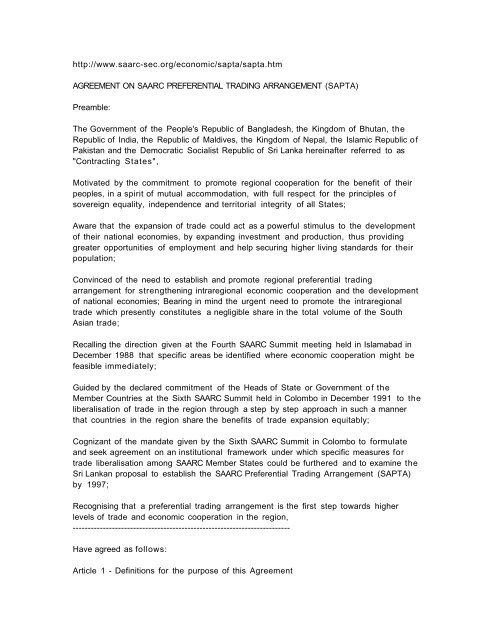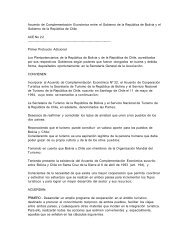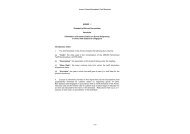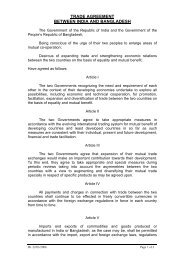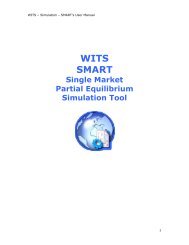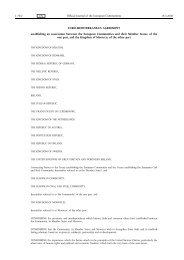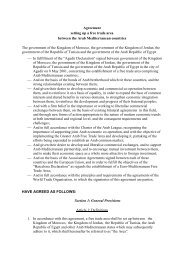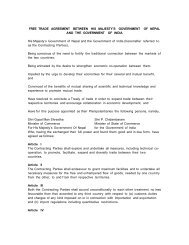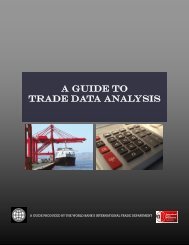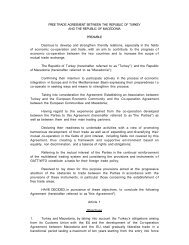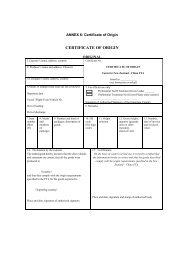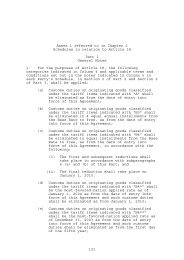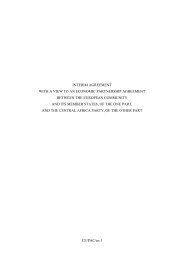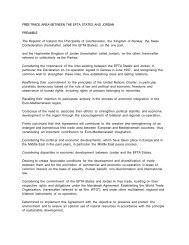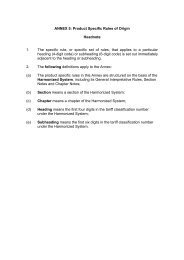sapta - WITS
sapta - WITS
sapta - WITS
You also want an ePaper? Increase the reach of your titles
YUMPU automatically turns print PDFs into web optimized ePapers that Google loves.
http://www.saarc-sec.org/economic/<strong>sapta</strong>/<strong>sapta</strong>.htmAGREEMENT ON SAARC PREFERENTIAL TRADING ARRANGEMENT (SAPTA)Preamble:The Government of the People's Republic of Bangladesh, the Kingdom of Bhutan, theRepublic of India, the Republic of Maldives, the Kingdom of Nepal, the Islamic Republic ofPakistan and the Democratic Socialist Republic of Sri Lanka hereinafter referred to as"Contracting States",Motivated by the commitment to promote regional cooperation for the benefit of theirpeoples, in a spirit of mutual accommodation, with full respect for the principles ofsovereign equality, independence and territorial integrity of all States;Aware that the expansion of trade could act as a powerful stimulus to the developmentof their national economies, by expanding investment and production, thus providinggreater opportunities of employment and help securing higher living standards for theirpopulation;Convinced of the need to establish and promote regional preferential tradingarrangement for strengthening intraregional economic cooperation and the developmentof national economies; Bearing in mind the urgent need to promote the intraregionaltrade which presently constitutes a negligible share in the total volume of the SouthAsian trade;Recalling the direction given at the Fourth SAARC Summit meeting held in Islamabad inDecember 1988 that specific areas be identified where economic cooperation might befeasible immediately;Guided by the declared commitment of the Heads of State or Government of theMember Countries at the Sixth SAARC Summit held in Colombo in December 1991 to theliberalisation of trade in the region through a step by step approach in such a mannerthat countries in the region share the benefits of trade expansion equitably;Cognizant of the mandate given by the Sixth SAARC Summit in Colombo to formulateand seek agreement on an institutional framework under which specific measures fortrade liberalisation among SAARC Member States could be furthered and to examine theSri Lankan proposal to establish the SAARC Preferential Trading Arrangement (SAPTA)by 1997;Recognising that a preferential trading arrangement is the first step towards higherlevels of trade and economic cooperation in the region,------------------------------------------------------------------------Have agreed as follows:Article 1 - Definitions for the purpose of this Agreement
(1) "Least Developed Country" means a country designated as such by the UnitedNations.(2) "Contracting State" means any Member State of the South Asian Association forRegional Cooperation (SAARC) which has entered into this Agreement.(3) "Serious injury" means significant damage to domestic producers, of like or similarproducts resulting from a substantial increase of preferential imports in situations whichcause substantial losses in terms of earnings, production or employment unsustainable inthe short term. The examination of the impact on the domestic industry concerned shallalso include an evaluation of other relevant economic factors and indices having abearing on the state of the domestic industry of that product.(4) "Threat of serious injury" means a situation in which a substantial increase ofpreferential imports is of a nature to cause "serious injury" to domestic producers, andthat such injury, although not yet existing, is clearly imminent. A determination of threatof serious injury shall be based on facts and not on mere allegation, conjecture, orremote or hypothetical possibility.(5) "Critical circumstances" means the emergence of an exceptional situation wheremassive preferential imports are causing or threatening to cause "serious injury" difficultto repair and which calls for immediate action.(6) "Sectoral basis" means agreements amongst Contracting States regarding theremoval or reduction of tariff, nontariff and paratariff barriers as well as other tradepromotion or cooperative measures for specified products or groups of products closelyrelated in enduse or in production.(7) "Direct trade measures" means measures conducive to promoting mutual trade ofContracting States such as long and mediumterm contracts containing import and supplycommitments in respect of specific products, buyback arrangements, state tradingoperations, and government and public procurement.(8) "Tariffs" means customs duties included in the national tariff schedules of theContracting States.(9) "Paratariffs" means border charges and fees, other than "tariffs", on foreign tradetransactions of a tarifflike effect which are levied solely on imports, but not thoseindirect taxes and charges, which are levied in the same manner on like domesticproducts. Import charges corresponding to specific services rendered are not consideredas paratariff measures.(10) "Nontariffs" means any measure, regulation, or practice, other than "tariffs" and" paratariffs", the effect of which is to restrict imports, or to significantly distort trade.(11) "Products" means all products including manufactures and commodities in theirraw, semiprocessed and processed forms.
------------------------------------------------------------------------Article 2 - Establishment and Aims1. By the present Agreement, the Contracting States establish the SAARC PreferentialTrading Arrangement (SAPTA) to promote and sustain mutual trade and the economiccooperation among the Contracting States, through exchanging concessions inaccordance with this Agreement.2. SAPTA will be governed by the provisions of this Agreement and also by the rules,regulations, decisions, understandings and protocols to be agreed upon within itsframework by the Contracting States.------------------------------------------------------------------------Article 3 - PrinciplesSAPTA shall be governed in accordance with the following principles(a) SAPTA shall be based and applied on the principles of overall reciprocity andmutuality of advantages in such a way as to benefit equitably all Contracting States,taking into account their respective levels of economic and industrial development, thepattern of their external trade, trade and tariff policies and systems;(b) SAPTA shall be negotiated step by step, improved and extended in successivestages with periodic reviews;(c) The special needs of the Least Developed Contracting States shall be clearlyrecognised and concrete preferential measures in their favour should be agreed upon;(d) SAPTA shall include all products, manufactures and commodities in their raw,semiprocessed and processed forms.------------------------------------------------------------------------Article 4 - ComponentsSAPTA may, interalia, consist of arrangements relating to:(a) tariffs;(b) paratariffs;(c) nontariff measures;(d) direct trade measures.------------------------------------------------------------------------Article 5 - Negotiations1. The Contracting States may conduct their negotiations for trade liberalisation inaccordance with any or a combination of the following approaches and procedures:
(a) Product by product basis;(b) Across the board tariff reductions;(c) Sectoral basis;(d) Direct trade measures.2. Contracting States agreed to negotiate tariff preferences initially on aproductbyproduct basis.3. The Contracting States shall enter into negotiations from time to time with a view t ofurther expanding SAPTA and the fuller attainment of its aims.------------------------------------------------------------------------Article 6 - Additional Measures1. Contracting States agree to consider, in addition to the measures set out in Article 4,the adoption of trade facilitation and other measures to support and complement SAPTAto mutual benefit.2. Special consideration shall be given by Contracting States to requests from LeastDeveloped Contracting States for technical assistance and cooperation arrangementsdesigned to assist them in expanding their trade with other Contracting States and intaking advantage of the potential benefits of SAPTA. The possible areas for suchtechnical assistance and cooperation are listed in Annex I.Article 7 - Schedules of ConcessionsThe tariff, paratariff and nontariff concessions negotiated and exchanged amongstContracting States shall be incorporated in the National Schedules of Concessions. Theinitial concessions agreed to by the Contracting States are attached as Annex II.Article 8 - Extension of Negotiated ConcessionsThe concessions agreed to under SAPTA, except those made exclusively to the LeastDeveloped Contracting States in pursuance of Article 10 of this Agreement, shall beextended unconditionally to all Contracting States.Article 9 - Committee of ParticipantsA Committee of Participants, hereinafter referred to as the Committee, consisting ofrepresentatives of Contracting States, is hereby established. The Committee shall meetat least once a year to review the progress made in the implementation of thisAgreement and to ensure that benefits of trade expansion emanating from thisAgreement accrue to all Contracting States equitably. The Committee shall also accordadequate opportunities for consultation on representations made by any ContractingState with respect to any matter affecting the implementation of the Agreement. TheCommittee shall adopt appropriate measures for settling such representations. TheCommittee shall determine its own rules of procedures.
------------------------------------------------------------------------Article 10 - Special Treatment for the Least Developed Contracting States1. In addition to other provisions of this Agreement, all Contracting States shall provide,wherever possible, special and more favourable treatment exclusively to the LeastDeveloped Contracting States as set out in the following subparagraphs:(a) Duty-free access, exclusive tariff preferences or deeper tariff preferences for theexport products,(b) The removal of nontariff barriers,(c) The removal, where appropriate, of paratariff barriers,(d) The negotiations of longterm contracts with a view to assisting Least DevelopedContracting States to achieve reasonable levels of sustainable exports of their products,(e) Special consideration of exports from Least Developed Contracting States in theapplication of safeguard measures,(f) Greater flexibility in the introduction and continuance of quantitative or otherrestrictions provisionally and without discrimination in critical circumstances by the LeastDeveloped Contracting States on imports from other Contracting States.------------------------------------------------------------------------Article 11 - NonapplicationNotwithstanding the measures as set out in Articles 4 and 6, the provisions of thisAgreement shall not apply in relation to preferences already granted or to be granted byany Contracting State to other Contracting States outside the framework of thisAgreement, and to third countries through bilateral, plurilateral and multilateral tradeagreements, and similar arrangements. The Contracting States shall also not be obligedto grant preferences in SAPTA which impair the concession extended under thoseagreements.Article 12 - CommunicationTransport and Transit Contracting States agree to undertake appropriate steps andmeasures for developing and improving communication system, transport infrastructureand transit facilities for accelerating the growth of trade within the region.------------------------------------------------------------------------Article 13 - Balance of Payments Measures:1. Notwithstanding the provisions of this Agreement, any Contracting State facingserious economic problems including balance of payments difficulties may suspendprovisionally the concessions as to the quantity and value of merchandise permitted t obe imported under the Agreement. When such action has taken place, the ContractingState which initiates such action, shall simultaneously notify the other ContractingStates and the Committee.
2. Any Contracting State which takes action according to paragraph 1 of this Articleshall afford, upon request from any other Contracting State, adequate opportunities forconsultations with a view to preserving the stability of the concessions negotiated underthe SAPTA. If no satisfactory adjustment is effected between the Contracting Statesconcerned within 90 days of such notification, the matter may be referred to theCommittee for review.------------------------------------------------------------------------Article 14 - Safeguard MeasuresIf any product, which is a subject of a concession with respect to a preference under thisAgreement, is imported into the territory of a Contracting State in such a manner or insuch quantities as to cause or threaten to cause, serious injury in the importingContracting State, the importing Contracting State concerned may, with priorconsultations, except in critical circumstances, suspend provisionally withoutdiscrimination, the concession accorded under the Agreement. When such action hastaken place the Contracting State which initiates such action shall simultaneously notifythe other Contracting State(s) concerned and the Committee shall enter intoconsultations with the concerned Contracting State and endeavour to reach mutuallyacceptable agreement to remedy the situation.In the event of the failure of the Contracting States to resolve the issue within 90 daysof the receipt of original notification, the Committee of Participants shall meet within 3 0days to review the situation and try to settle the issue amicably. Should theconsultations in the Committee of Participants fail to resolve the issue within 60 days,the parties affected by such action shall have the right to withdraw equivalentconcession(s) or other obligation(s) which the Committee does not disapprove of.------------------------------------------------------------------------Article 15 - Maintenance of the Value of ConcessionsAny of the concessions agreed upon under this Agreement shall not be diminished ornullified, by the application of any measures restricting trade by the Contracting Statesexcept under the provisions as spelt out in other Articles of this Agreement.------------------------------------------------------------------------Article 16 - Rules of OriginProducts contained in the National Schedules of Concessions annexed to this Agreementshall be eligible for preferential treatment if they satisfy the rules of origin, includingspecial rules of origin, in respect of the Least Developed Contracting States, which areset out in Annex III.------------------------------------------------------------------------Article 17 - Modification and Withdrawal of Concessions
1. Any Contracting State may, after a period of three years from the day the concessionwas extended, notify the Committee of its intention to modify or withdraw anyconcession included in its appropriate schedule.2. The Contracting State intending to withdraw or modify a concession shall enter intoconsultation and/or negotiations, with a view to reaching agreement on any necessaryand appropriate compensation, with Contracting States with which such concession wasinitially negotiated and with any other Contracting States that have a principal orsubstantial supplying interest as may be determined by the Committee.3. Should no agreement be reached between the Contracting States concerned withinsix months of the receipt of notification and should the notifying Contracting Stateproceed with its modification or withdrawal of such concessions, the affectedContracting States as determined by the Committee may withdraw or modify equivalentconcessions in their appropriate schedules. Any such modification or withdrawal shall benotified to the Committee.------------------------------------------------------------------------Article 18 - Withholding or Withdrawal of ConcessionsA Contracting State shall at any time be free to withhold or to withdraw in whole or inpart any item in its schedule of concessions in respect of which it determines that it wasinitially negotiated with a State which has ceased to be a Contracting State in thisAgreement. A Contracting State taking such action shall notify the Committee, and uponrequest, consult with Contracting States that have a substantial interest in the productconcerned.------------------------------------------------------------------------Article 19 Consultations:1. Each Contracting State shall accord sympathetic consideration to and shall affordadequate opportunity for consultations regarding such representations as may be madeby another Contracting State with respect to any matter affecting the operation of thisAgreement.2. The Committee may, at the request of a Contracting State, consult with anyContracting State in respect of any matter for which it has not been possible to find asatisfactory solution through such consultation under paragraph 1 above.------------------------------------------------------------------------Article 20 - Settlement of DisputesAny dispute that may arise among the Contracting States regarding the interpretationand application of the provisions of this Agreement or any instrument adopted within itsframework shall be amicably settled by agreement between the parties concerned. In theevent of failure to settle a dispute, it may be referred to the Committee by a party t othe dispute. The Committee shall review the matter and make a recommendation
thereon within 120 days from the date on which the dispute was submitted to it. TheCommittee shall adopt appropriate rules for this purpose.------------------------------------------------------------------------Article 21 - Withdrawal from SAPTA:1. Any Contracting State may withdraw from this Agreement at any time after its entryinto force. Such withdrawal shall be effective six months from the day on which writtennotice thereof is received by the SAARC Secretariat, the depositary of this Agreement.That Contracting State shall simultaneously inform the Committee of the action it hastaken.2. The rights and obligations of a Contracting State which has withdrawn from thisAgreement shall cease to apply as of that effective date.3. Following the withdrawal by any Contracting State, the Committee shall meet within30 days to consider action subsequent to withdrawal.------------------------------------------------------------------------Article 22 - Entry into ForceThis Agreement shall enter into force on the thirtieth day after the notification issued bythe SAARC Secretariat regarding completion of the formalities by all Contracting States.------------------------------------------------------------------------Article 23 - ReservationsThis Agreement may not be signed with reservations nor shall reservations be admittedat the time of notification to the SAARC Secretariat of the completion of formalities.------------------------------------------------------------------------Article 24 - AmendmentsThis Agreement may be modified through amendments to this Agreement. Allamendments shall become effective upon acceptance by all Contracting States.------------------------------------------------------------------------Article 25 - DepositaryThis Agreement shall be deposited with the Secretary General of SAARC who shallpromptly furnish a certified copy thereof to each Contracting State.------------------------------------------------------------------------IN WITNESS WHEREOF the undersigned being duly authorized thereto by their respectiveGovernments have signed this Agreement on the SAARC Preferential TradingArrangement.
Done at DHAKA this ELEVENTH day of APRIL One Thousand Nine Hundred Ninety Threein eight originals in the English language.A.S.M. MOSTAFIZUR RAHMAN, Minister of Foreign Affairs Minister of Foreign AffairsPeople's Republic of BangladeshDAWA TSERING, Minister of Foreign Affairs, Kingdom of BhutanDINESH SINGH, Minister of External Affairs, Republic of IndiaFATHULLA JAMEEL, Minister of Foreign Affairs, Republic of MaldivesMAHESH ACHARYA, State Minister of Finance, His Majesty's Government of NepalMOHAMMAD SIDDIQUE KHAN KANJU, Minister of State for Foreign Affairs, IslamicRepublic of PakistanHAROLD HERAT, Minister of Foreign Affairs, Democratic Socialist Republic of Sri Lanka------------------------------------------------------------------------Annex IADDITIONAL MEASURES IN FAVOUR OF LEAST DEVELOPED CONTRACTING STATES(a) The identification, preparation and establishment of industrial and agriculturalprojects in the territories of Least Developed Contracting States which could provide theproduction base for the expansion of exports of Least Developed Contracting States t oother Contracting States, possibly linked to cooperative financing and buybackarrangements;(b) the setting up of manufacturing and other facilities in Least Developed ContractingStates to meet intra-regional demand under cooperative arrangements;(c) the formulation of export promotion policies and the establishment of trainingfacilities in the field of trade to assist Least Developed Contracting States in expandingtheir exports and in maximising their benefits from SAPTA;(d) the provision of support to export marketing of products of Least DevelopedContracting States by enabling these countries to share existing facilities (for example,with respect to export credit insurance, access to market information) and byinstitutional and other positive measures to facilitate imports from Least DevelopedContracting States into their own markets;(e) bringing together of enterprises in other Contracting States with project sponsors inthe Least Developed Contracting States (both public and private) with a view t opromoting joint ventures in projects designed to lead to the expansion of trade;(f) the provision of special facilities and rates in respect to shipping.------------------------------------------------------------------------
Annex I INational Schedules of Concessions (circulated separately)------------------------------------------------------------------------Annex IIIRULES OF ORIGINRULE 1: Originating products - Products covered by preferential trading arrangementswithin the framework of the SAPTA imported into the territory of a Contracting Statefrom another Contracting State which are consigned directly within the meaning of Rule5 hereof, shall be eligible for preferential concessions if they conform to the originrequirement under any one of the following conditions:(a) Products wholly produced or obtained in the exporting Contracting State as definedin Rule 2; or(b) Products not wholly produced or obtained in the exporting Contracting State,provided that the said products are eligible under Rule 3 or Rule 4.RULE 2: Wholly produced or obtained - Within the meaning of Rule 1 (a) the followingshall be considered as wholly produced or obtained in the exporting Contracting State:(a) raw or mineral products extracted from its soil, its water or its seabeds:1(b) agricultural products harvested there;2(c) animals born and raised there;(d) products obtained from animals referred to in paragraph (c) above;(e) products obtained by hunting or fishing conducted there;(f) products of sea fishing and other marine products taken from the high seas by itsvessels; 3 / 4(g) products processed and/or made on boards its factory ships 4/5 exclusively fromproducts referred to in paragraph (f) above;(h) used articles collected there, fit only for the recovery of raw materials;(i) waste and scrap resulting from manufacturing operations conducted there;(j) goods produced there exclusively from the products referred to in paragraph (a) t o(i) above.
RULE 3 : Not wholly produced or obtained(a) Within the meaning of Rule 1(b), products worked on or processed as a result ofwhich the total value of the materials, parts or produce originating from nonContractingStates or of undetermined origin used does not exceed 50 per cent of the f.o.b. value ofthe products produced or obtained and the final process of manufacture is performedwithin the territory of the exporting Contracting State shall be eligible for preferentialconcessions subject to the provisions of Rule 3(c) and Rule 4 .(b) Sectoral agreements 6(c) The value of the nonoriginating materials, parts or produce shall be:(i) The c.i.f. value at the time of importation of materials parts or produce where thiscan be proven: or(ii) The earliest ascertainable price paid for the materials, prices or produce ofundetermined origin in the territory of the Contracting State where the working orprocessing takes place.RULE 4: Cumulative rules of origin - Products which comply with origin requirementsprovided for in Rule 1 and which are used by a Contracting State as input for a finishedproduct eligible for preferential treatment by another Contracting State shall beconsidered as a product originating in the territory of the Contracting State whereworking or processing of the finished product has taken place provided that theaggregate content originating in the territory of the Contracting State is not less than60 percent of its f.o.b. value7.RULE 5 : Direct consignment - The following shall be considered as directly consignedfrom the exporting Contracting State to the importing Contracting State:(a) if the products are transported without passing through the territory of any non-Contracting State:(b) the products whose transport involves transit through one or more intermediatenonContracting States with or without transhipment or temporary storage in suchcountries, provided that:(i) the transit entry is justified for geographical reason or by considerations relatedexclusively to transport requirements;(ii) the products have not entered into trade or consumption there; and(iii) the products have not undergone any operation there other than unloading andreloading or any operation required to keep them in good condition.
RULE 6: Treatment of packing - When determining the origin of products, packing shouldbe considered as forming a whole with the product it contains. However, packing may betreated separately if the national legislation so required.RULE 7: Certificate of Origin - Products eligible for preferential concessions shall besupported by a Certificate of Origin8 issued by an authority designated by thegovernment of the exporting Contracting State and notified to the other ContractingStates in accordance with the Certification Procedures appearing on pages 15 and 16 ofthis Annex.RULE 8 :(a) In conformity with Article 15 of the Agreement on SAPTA and national legislations,any Contracting State may prohibit importation of products containing any inputsoriginating from States with which it does not have economic and commercial relations.(b) Contracting States will do their best to cooperate in order to specify origin of inputsin the Certificate of Origin.RULE 9: Review - These Rules may be reviewed as and when necessary upon request ofone-third of the Contracting States and may be open to such modifications as may beagreed upon.RULE 10: Special criteria percentage- Products originating in Least DevelopedContracting States can be allowed a favourable 10 percentage points applied to thepercentage established in Rules 3 and 4. Thus, for Rule 3, the percentage would notexceed 60 per cent, and for Rule 4, the percentage would not be less than 50 per cent.------------------------------------------------------------------------1 Include mineral fuels, lubricants and related materials as well as mineral of metal ores.2 Include forestry products.3 "Vessels" shall refer to fishing vessels engaged in commercial fishing, registered in aContracting State's country and operated by a citizen or citizens or governments ofContracting State or partnership, corporation or association, duly registered in suchContracting State's country, at cost 60 per cent of equity of which is owned by a citizenor citizens and/or government of such Contracting State or 75 percent by citizensand/or governments of the Contracting States. However, the products taken fromvessels engaged in commercial fishing under bilateral agreements which provide forchartering/leasing of such vessels and/or sharing of catch between Contracting Stateswill also be eligible for preferential concessions.4 In respect of vessels or factory ships operated by government agencies therequirement of flying the flag of a Contracting State does not apply.
5 For the purpose of this Agreement, the term "factory ship" means any vessels, asdefined, used for processing and/or making on board products exclusively from thoseproducts referred to in paragraph (f) above.6 In respect of products traded within the framework of sectoral agreements negotiatedunder SAPTA, provision may need to be made for special criteria to apply. Considerationmay be given to these criteria as and when the sectoral agreements are negotiated.7 "Partial" cumulation as implied by Rule 4 above means that only products which haveacquired originating status in the territory of one Contracting State may be taken intoaccount when used as inputs for a finished product eligible for preferential treatment inthe territory of another Contracting State.8 A standard Certificate of Origin to be used by all Contracting States is annexed andapproved by the Contracting States.------------------------------------------------------------------------CERTIFICATE OF ORIGIN------------------------------------------------------------------------ADDENDUMAmendment to SAPTA Rules of OriginThe SAARC Council of Ministers at its Twenty-first Session held in Nuwara Eliya, SriLanka, on 18-19 March 1999, approved the amendments to the Rules 3(a), 4 and 1 0relating to the Rules of Origin (Annex-II) of the SAARC Preferential Trading Arrangement(SAPTA) with immediate effect.The new amended rules now read as follows:Rule 3(a): Not wholly produced or obtained –Within the meaning of Rule 1(b), products worked on or processed as a result of whichthe total value of the materials, parts or produce originating from non-ContractingStates or of undetermined origin used does not exceed 60 per cent of the f.o.b. value ofthe products produced or obtained and the final process of manufacture is performedwithin the territory of the exporting Contracting State shall be eligible for preferentialconcessions subject to the provisions of Rule 3(c) and Rule 4.Rule 4: Cumulative rules of origin –Products which comply with origin requirements provided for in Rule 1 and which areused by a Contracting State as input for a finished product eligible for preferentialtreatment by another Contracting State shall be considered as a product originating inthe territory of the Contracting State where working or processing of the finishedproduct has taken place provided that the aggregate content originating in the territoryof the Contracting State is not less than 50 percent of its f.o.b. value.Rule 10: Special criteria percentage –
Products originating in Least Developed Contracting States can be allowed a favourable10 percentage points applied to the percentage established in Rules 3 and 4. Thus, forRule 3, the percentage would not exceed 70 per cent, and for Rule 4, the percentagewould not be less than 40 per cent.


